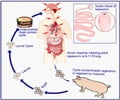Glossary
Acute: Intense, unforeseen and fleetingInflammation: Indicating swelling, pain and redness in the area of swelling.
Meninges: Encompasses the three protective membranes that cover the brain and spinal cord.
Cerebrospinal fluid (CSF): The area around the brain and spinal cord is filled with a fluid called Cerebrospinal fluid.
Immunity: Pertains to the body’s inherent protective mechanism that offers resistance to an infectious disease.
Chronic: Implying a permanent, repetitive condition lasting for years.
Incubation: The duration between the onset of infection caused by a pathogen and the manifestation of clinical symptoms.
Vaccine: A substance, whose attributes causes the activation of the immune system, to take on an imminent intruder to the body in the form of microorganisms.
Infection: An attack on the body by disease inducing agents like bacteria, viruses or fungi which inflict harm to the body and tissues.
Intravenous: Through a vein.
Parasite: That which completely depends on or resides inside another organism drawing sustenance from the host.
Constipation: Difficulty in passing motion due to sluggish bowel movements.
Coma: A state of unarousable unconsciousness.
Seizure: Convulsions; sudden, involuntary movements of the muscles.
Rash: A cluster of spots on a swollen patch of skin.
Insomnia: A state of persistent wakefulness during sleep hours; victims are simply unable to fall asleep at night.
Feces: Waste from the body also called as stools. This waste is expelled from the bowels.
Protozoal: Relates to the most basic and completely uncomplicated organism in the animal kingdom- Protozoa. They are organisms which contain just one cell, like amoeba.
Transplantation: The surgical transfer of an organ or tissue from one position (or person) to another.
Response: In medical parlance, ‘response’ is indicative of a positive development associated with the treatment.
Cardiomyopathy: A condition where the heart muscle is diseased and becomes incapable of efficiently pumping blood.










